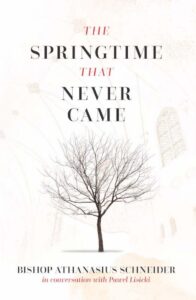We are pleased to share “Respecting the Body and Blood of the Lord: When Holy Communion Should be Denied” by Cardinal Raymond Burke with commentary by Thomas McKenna, published by Sophia Press Institute.
Summary:
“I invite you to pray with me…that, faithful to the mission of Christ, her Bridegroom, [the Church] will be faithful, limpid and uncompromising in the application of can. 915, defending the sanctity of the Holy Eucharist.”
~Raymond Leo Cardinal Burke
For at least two decades, His Eminence, Cardinal Burke, has been virtually the lone voice of reason on the issue of scandal surrounding public figures who defy Catholic teaching and yet continue to receive Communion.
At the same time, he has been a truly charitable influence in the debate and a strong leader who continues to guide the Church through confusing times.
This present volume, Respecting the Body and Blood of the Lord: When Holy Communion Should Be Denied, offers the text of His Eminence’s original book Why Deny Communion? – written primarily for our clergy – with an added commentary suited to the laity.
Mr. Thomas McKenna, President of Catholic Action for Faith & Family, has penned a brief and incisive series of reflections and questions at the end of each chapter, which seeks to apply the wisdom of His Eminence’s writing to the daily lives and circumstances of the Catholic in the pew.
Each short commentary contains a short restatement of that chapter’s teaching followed by a real-time “Application” to Catholics, a few “Key Takeaways” from the chapter and a final section entitled, “Personal Points to Ponder.”
These are a few of the questions Mr. McKenna addresses in his commentary:
- Why the notion that the Church is “weaponizing the Eucharist” by denying Communion is the wrong way to understand what Church leaders are doing.
- How the Church has consistently taught about Eucharistic discipline from the very beginning to the present day.
- Why sins against the Eucharist are sins against Christ Himself.
- How the average Catholic can live a strong Eucharistic faith and at the same time urge others to be accountable to the laws and teachings of the Church.
- What to do if someone in your family is causing scandal by not adhering to the Church’s Eucharistic discipline; and most importantly,
- How we ourselves may avoid the twin pitfalls of value relativism and cowardice in insisting on the Truth of the Eucharist for our own lives and in our families.
You will never find a better or more comprehensive treatment of the Church’s Eucharistic discipline then Cardinal Burke’s timely book, and Thomas McKenna’s commentary is icing on the cake!
Fact
Catholic Action for Faith & Family sent Cardinal Burke’s book Why Deny Communion? to every Catholic clergyman in the United States in February of this year. The mailing was sent to 41,000 bishops, priests, and deacons in these numbers:
- 382 Roman Catholic bishops (including Archbishops and Cardinals)
- 750 bishops and clergy of the Catholic Eastern Rites
- All 27,416 Catholic priests and
- All 12,748 Catholic deacons in the US.
Excerpts
From the February 14th article in the Catholic World Report, “Have the Bishops Finally Had Enough?”
Catholics make up 28% of the (newly-elected) 118th Congress. Bill Donohue of the Catholic League has analyzed the numbers and offered a stark reality check for bishops, clergy, and faithful alike:
- 65 Democrats in the House of Representatives claim Catholic affiliation, and 54 of these have a perfect pro-abortion voting record; all ten of the newly-elected Catholic Democrats are pro-abortion;
- Of the 15 Catholic senators, twelve of them (80%) have perfect pro-abortion records.
The scandal of public dissenters is far from being a small, localized blaze that can be put out with a bucket of water. When 98% of Catholic House Democrats and 80% of Catholic Senators are pro-abortion, you’re in the path of a massive wildfire raging out of control.
———-
Commentary for Chapter 2: Fathers of the Church and Theologians
Cardinal Burke cites at least six Fathers and saints of the Church as models of the Eucharistic discipline that has coursed through the Church’s veins throughout twenty centuries. These saints are only prime examples; he could have added hundreds more.
No institution in history has a better lineup of authorities (saints and authoritative teachers) than the Catholic Church to affirm the divine nature of its doctrine. His Eminence wants to show us by their words and examples that the struggle for “Eucharistic coherence” (a modern term for Eucharistic discipline) is not new: it is the gift and responsibility of every Catholic.
Application
A RealClear Opinion poll conducted in June of 2022 found that fully half of Catholics do not believe in the Real Presence of Christ in the Eucharist. Less than 40% go to Confession even on a yearly basis. This is a profoundly shocking revelation that indicates the loss of faith and the failure of basic catechesis in the Church today.
It is also exactly why we need a spiritual authority, especially on such a critical matter as the Eucharist. Divine truths can always be discerned and understood more deeply, but they are not open to debate once they have been authoritatively articulated by the Church’s magisterium.
The Protestant revolution in the 1500s rejected centuries of Catholic teaching on the Eucharist. This opened the door to the heretical idea that the bread and wine of the Eucharist are just symbols. Many other connected truths were also denied, such as belief in the ordained priesthood. Our modern age inherited this legacy of relativism, and opinion polls show the widespread spiritual damage among the baptized.
Personal Points to Ponder
Do I obey the teaching authority of the Church in all matters, or am I a “cafeteria Catholic” obeying those teachings that suit me while ignoring those that don’t?
Have I adopted the spirit of relativism in my view of the Eucharist? Am I convinced that the Eucharist is the Body, Blood, Soul and Divinity of Christ, or do I believe that the Eucharistic species are just symbols?
Have I communicated to my own family the conditions for receiving the Eucharist worthily: Confession of mortal sin, the Eucharistic fast, being in the state of grace, and being in full communion with the Church?
Author Bio – Cardinal Raymond Leo Burke
Born in 1948 in Richland Center, Wisconsin, Raymond Leo Burke attended seminary in La Crosse, Wisconsin, Washington, D.C., and Rome, where he was ordained a priest by Pope St. Paul VI in 1975. Ordained a bishop in 1995 by Pope St. John Paul II, he served for almost nine years as bishop of La Crosse, where he founded the Shrine of Our Lady of Guadalupe. For more than four years, he served as archbishop of Saint Louis. He was appointed prefect of the Supreme Tribunal of the Apostolic Signatura in Rome by Pope Benedict XVI in 2008. He was named a cardinal in 2010 by Pope Benedict XVI. Cardinal Burke has written and spoken widely on Roman Catholic canon law, the Holy Eucharist, devotion to the Sacred Heart of Jesus, devotion to Our Lady of Guadalupe, and the sanctity of human life. He is a member of the Supreme Tribunal of the Apostolic Signatura.
Author Bio – Thomas McKenna
Thomas McKenna is the founder and president of Catholic Action for Faith and Family and St. Gianna Physicians Guild. He also serves as the executive director of the Confraternity of Catholic Clergy, a national association of priests and deacons. He is the author of The Fatima Century: How the Pilgrim Virgin Is Changing Our Generation and St. Gianna Beretta Molla: A Modern Day Hero of Divine Love. McKenna is a friend of Cardinal Raymond Burke and worked closely with him for more than twenty-five years. He is a member of the Equestrian Order of the Holy Sepulchre of Jerusalem and a Fourth Degree Knight of Columbus.





